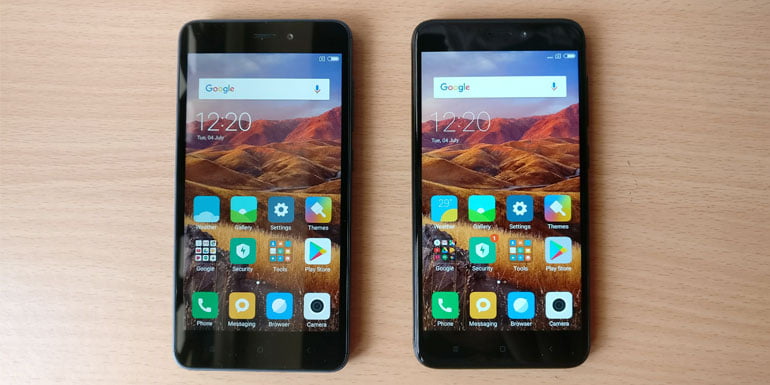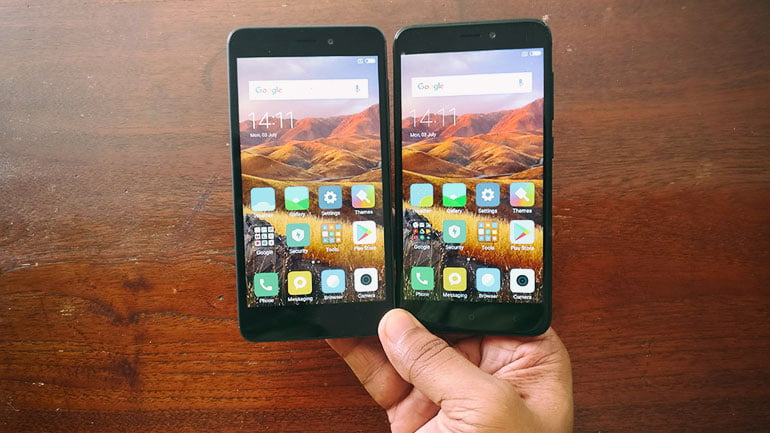Xiaomi is taking over the budget smartphone market and it becomes more evident with the launch of Redmi 4 and 4A smartphones. First of all, getting hold of these devices from the flash sales is an almost impossible task. The base models of these phones differ by just thousand bucks but, Xiaomi has a lot to offer for the price paid. We got a chance to check out these smartphones, and here is our perception.
Look and Feel
Both the devices are aesthetically appealing, however Redmi 4 holds the upper hand. Redmi 4A being cheaper is of polycarbonate finish and comes in two colours, grey and gold. In contrast, Redmi 4 has a matte metallic body with black and gold variants. You’ll feel the difference when you hold it, Redmi 4A is lighter but sturdy, whereas Redmi 4 is slightly heavier. The full front glass, curved sides and rounded edges make Redmi 4 more inviting. They have comparatively the same form factor and screen estate.

Hardware, Software and Design
Analysing the hardware, we can see the following differences. Redmi 4 houses better SoC and GPU, better primary camera, bigger battery and a rear-mounted fingerprint sensor. Running MIUI 8 based on Android 6.0.1 Marshmallow, they offer stutter-free operation. Powered by Snapdragon 435 octa-core processor, the Redmi 4 offers three choices for RAM+ storage (2GB + 16GB, 3GB + 32GB, 4GB + 64GB). While the Redmi 4A has only two storage variants (2GB + 16GB, 3GB + 32GB) powered by Snapdragon 425 quad-core processor.
| Specification | Redmi 4A | Redmi 4 |
| SoC | Snapdragon 425 Quad-core | Snapdragon 435 Octa-core |
| GPU | Adreno 308 | Adreno 506 |
| Camera | Primary F-Stop 2.2 | Primary F-Stop 2.0 |
| Fingerprint Sensor | No | Yes |
| Battery | 3120 mAh | 4100 mAh |
| Dimensions | 139.9 x 70.4 x 8.5 (mm) | 139.24 x 69.96 x 8.65 (mm) |
| Weight | 131.5g | 150g |
Regarding the design, on the front both devices have non-backlit capacitive buttons, notification LED, front facing 5MP camera, proximity and light sensors and earpiece. On the back side is the 13MP primary camera with flash, and Redmi 4A has backfiring speakers, while Redmi 4 has the fingerprint sensor. On the top side, both have the 3.5mm audio port, IR blaster and noise cancelling mic. At the bottom, both are having microUSB 2.0 port, mic, and the Redmi 4 has bottom firing speaker grills. The left side has the SIM tray, meanwhile, the right side bears the power button and volume rockers.
Network and Connectivity
These support dual SIMs with 4G VoLTE capability, when two SIM cards are used simultaneously, the primary SIM can support 4G calls and data while the secondary SIM can support 2G calls only. Optionally you can use Micro SIM + Nano SIM or Micro SIM + SD Card. In addition the device sports, IR blaster, Bluetooth 4.1 and 802.11 b/g/n 2.4GHz Wi-Fi.




Performance and Benchmarking
Evaluating the performance as a daily driver, both produced good results. Call and signal quality were excellent for both. Medium to average performance is exhibited for surfing, streaming, and gaming. On a typical usage scenario with voice calls, surfing, streaming, and gaming, the battery backup of Redmi 4A lasted over a day and a half, whereas Redmi 4 gave over 2 days as promised. The camera of these devices also does a pretty decent job considering the budget. The Redmi 4A managed to capture quality shots in daylight, but inconsistent with indoor or artificial lighting, and rather grainy shots in dim light. The Redmi 4 however manages decent snaps in daylight and indoors, and is an average shooter in dim light. The IR blaster turns out to be pretty useful with the programmable Mi Remote app. Slow charging (~3 hours to full charge) and Android M out of the box might concern a few.

Benchmarking these devices is kind of overkill but here are some of the results. We would say these aren’t meant for heavy gamers, but still not bad at all.
| Benchmark Tool | Redmi 4A | Redmi 4 |
| AnTuTu | 32010 | 41415 |
| Quadrant | 8371 | 12,800 |
Overall
To sum up, Xiaomi is offering some killer deals in the 10K bracket. For an average user, the Redmi 4A serves the purpose. But in any day we would say for an extra thousand bucks, the Redmi 4 is a better choice of the two. Hope the article was enjoyable and we cleared the air for you. Peace!


